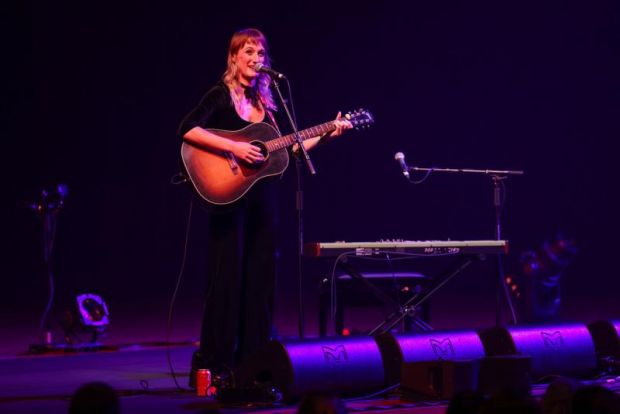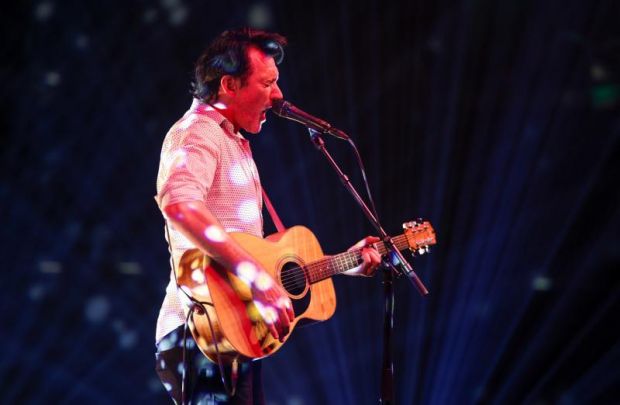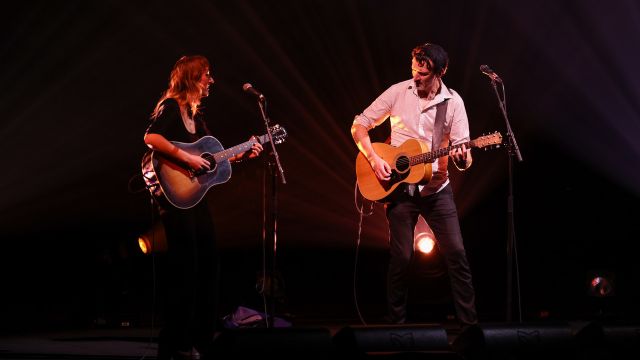Shotgun Karaoke Vol. II
There is a particular thrill that comes from watching an artist with decades of influence walk onstage carrying nothing but a guitar and the absolute conviction that this is all he needs. At QPAC’s Concert Hall, Paul Dempsey proves again and again that this stripped back format is not a limitation but a liberation. But before he takes the room on a tour through the collective nostalgia of several decades of beloved songs, the night opens with an intimate performance from his chosen support act.
Carla Geneve arrives on stage with little ceremony and a kind of unguarded candour that immediately sets the tone for her performance. She appears almost nervously self aware in those first few moments, the way an artist does when their emotional world is about to be placed under a microscope. Once she settles at the keys, the room falls into a kind of breath held quiet that is less about judgement and more about respect. Her lyrics rise through the hall in a low, smoky register that gives way to a crystalline sweetness whenever she leans into the higher notes. The contrast creates a sense of volatility that perfectly matches the emotional territory she writes from.
Geneve has a talent for folding vulnerability into strength. Her songs sit in that tender space between sadness and resilience. At the keyboard her voice feels suspended in the air, buoyed by warm reverb and supported by the gentlest touch. When she moves to acoustic guitar the set gains a plucky folk edge, occasionally flirting with country textures but always guided by her instinct for simplicity. She does not hide behind sound. She leaves room for silence and that silence often lands with more power than a rhythm section ever could.
She has not yet learned to trust that power. Several times she seems rattled by the stillness in the room, misreading the audience’s intense focus for indifference. In reality the quiet is an act of generosity. Her lyrics are honest enough to demand attentive listening and the hall responds exactly as her writing deserves. There are flashes of Marianne Faithfull and Martha Wainwright in her tone and phrasing. Her final number, a slow and tender cover of Simply the Best, reveals a playful confidence that has been simmering beneath the nerves. The audience reacts instantly and breaks into full voice. It is the most animated they have been and a reminder that Geneve is at her most magnetic when she finally lets herself believe the room is with her.

After the interval the atmosphere shifts completely. The audience greets Paul Dempsey with ecstatic recognition and adoration. There is an ease to the way he walks onstage, as if stepping into his natural habitat, and that ease sets the tone for everything that follows. He opens with Time to Pretend by MGMT and from the first line the entire night aligns itself around the idea that a good cover is not an imitation. For Dempsey a cover is an excavation. He pulls each song apart until he finds the emotional engine that drives it and then he rebuilds it in a way that feels both familiar and new.
Throughout the set he demonstrates a level of technical fluidity that borders on sleight of hand. It often sounds as if there are two guitarists on stage, one responsible for rhythm and the other for intricate melodic lines. Instead it is Dempsey weaving both roles together without ever breaking the pulse of the song. He has the sort of musical intelligence that is so complete it appears effortless.
Losing My Religion arrives next and instantly triggers a wave of collective nostalgia. The audience surrenders to the ‘karaoke’ title with real enthusiasm. Dempsey navigates the mandolin inspired riffs with such precision that the transition between lead figures and strummed warmth feels seamless. With every vocal turn the emotional truth of the song rises right to the surface.
The setlist unfolds like a guided tour through several decades of popular music. Bette Davis Eyes shimmers with a smooth and velvety tone. Light Pollution is lit by blue green gobos that move like water and match the emotional urgency of the performance. Caroline carries a storm of grief and longing and his fingers move so quickly across the strings they seem to leave echoes behind them. When the unmistakable opening notes of Last Goodbye drift into the hall the audience reacts with genuine glee. Dempsey delivers the high notes with astonishing control and adds an unexpected grit that gives the song a more earthbound ache than Jeff Buckley ever leant into.
He follows with a gentle and utterly sincere reading of Jesus, etc that reduces the room to silence. Atlantic City reveals the storyteller beneath the technician. Near the end he releases a series of soft rising woohoos that feel haunting and strangely intimate. Against All Odds fills the Concert Hall with a starfield of light while the sound itself feels far larger than a lone guitarist should ever be able to produce. Life on Mars becomes one of the strongest moments of the night. He holds the challenging high notes with a focus that borders on athletic and in the final long note is held for what feels like four bars, demonstrating astounding breath control.
The evening shifts again when Carla Geneve returns to the stage for The Chain. They falter on the lyrics more than once, laugh at themselves and carry on. Far from diminishing the moment the imperfections create a shared joy that sweeps the hall along with them. Their voices blend with warmth and Dempsey’s guitar solo builds into a lively and confident duet that leaves the room buzzing.

Other highlights include a ferocious and breath defying Berlin Chair delivered in response to an audience request and a deeply satisfying version of Ship of Fools that showcases the richness of Dempsey’s lower register. Stop arrives as something fragile and bruised. He uses the falsetto early then gently lowers the line into deeper territory, revealing layers of intention that many performers never attempt. Turn Back Time unleashes a full audience sing along and he leans into the spirit of the song with a sympathetic nod to Cher’s tonal colour.
After briefly leaving the stage he returns for an encore that begins with Way of the World by Max Q. The political and emotional conviction in this performance feels sincere and unguarded. He closes the night with The Boys of Summer, played with such rhythmic and melodic dexterity that it becomes easy to forget he is doing the work of several musicians at once.
Special mention to the lighting and sound designers and operators at QPAC. They do a stellar job of ensuring the mix sounds great. The lighting is pure magic on more than one occasion and without it, the show wouldn’t feel as emotionally affecting as it does.
What makes the night special is not the polish but the humanity. The occasional lyrical tangle, the spontaneous diversions, the moments where the audience yells suggestions or simply joins the song before they are invited, none of this detracts from the experience. Instead it reinforces the truth at the core of live performance. We do not go to concerts to hear flawless replicas of studio recordings. We go to feel something that exists only in that brief collision of artist, audience and atmosphere.
On this particular night that feeling is joy, nostalgia, reverence and unfiltered emotional connection. Paul Dempsey offers all of it with generosity and playfulness. Carla Geneve opens the window to her inner world with disarming honesty. Together they create an evening that reminds everyone present why live music continues to matter.
Kitty Goodall
Photography by Peter Wallis
Subscribe to our E-Newsletter, buy our latest print edition or find a Performing Arts book at Book Nook.

